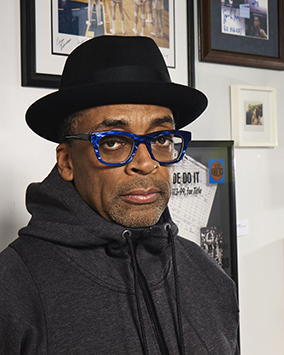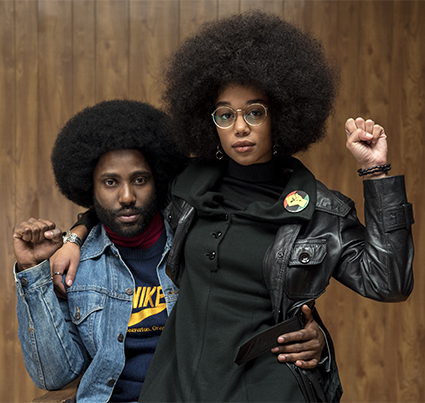SPIKE, STILL SHARP
August 15, 2018 by Las Vegas Black Image Magazine
Filed under Cover Story, Feature
As he prepares to release another unflinching examination of American race relations, Kimberly Bailey-Tureaud recalls special moments in a legendary director’s career.
Whenever a new movie by master filmmaker Spike Lee is released into theaters, the memories come flooding back. I was in my third year at Spelman College when Lee — a Morehouse man — asked me to help promote his first movie: 1983’s “Joe’s Bed-Stuy Barbershop: We Cut Heads.”
It was a fantastic opportunity, and I was thrilled to work with the director — alongside my best college girlfriend, Barbara Davis, along with Monti Ross and George Folks — as we bounced around Atlanta, hanging posters and inviting people to a screening that would become Spike’s coming-out party. The conversations and debates were unforgettable, and I knew there was something special about the director from the moment we met.
That combative, uncompromising, intellectually curious manner would manifest itself gloriously in a one-man canon of classic films that meticulously explore contemporary black life and African-American history: “She’s Gotta Have It,” “School Daze,” “Do the Right Thing,” “Mo’ Better Blues,” “Jungle Fever,” “Malcolm X,” “Crooklyn,” “Get on the Bus,” “Bamboozled,” and the acclaimed documentary “4 Little Girls.”
Today, the two-time Oscar nominee — and recipient of an honorary Academy Award for his remarkable achievements — is about to release his latest feature, “BlacKkKlansman,” the fact-based tale of black detective Ron Stallworth (John David Washington, son of Denzel) who sets out to make a name for himself with a dangerous mission: infiltrating and exposing the Ku Klux Klan.
Produced by the team behind the Oscar-winning smash “Get Out,” “BlacKkKlansman” closes with footage from last year’s lethal white nationalist rally in Charlottesville, and is set to hit theaters on the one-year anniversary of those riots.
“Jordan Peele called me out of the blue and started describing the film concept, ‘This black man joins the KKK…’ and automatically, I thought of the Dave Chappelle skit where Chappelle plays a blind black man who joins the KKK, unaware that he isn’t white. I joked and said, ‘Dave Chappelle did this already.’”
The result of that conversation is a another Lee classic: an unflinching examination of race relations that is bracingly relevant in today’s tumultuous world.








